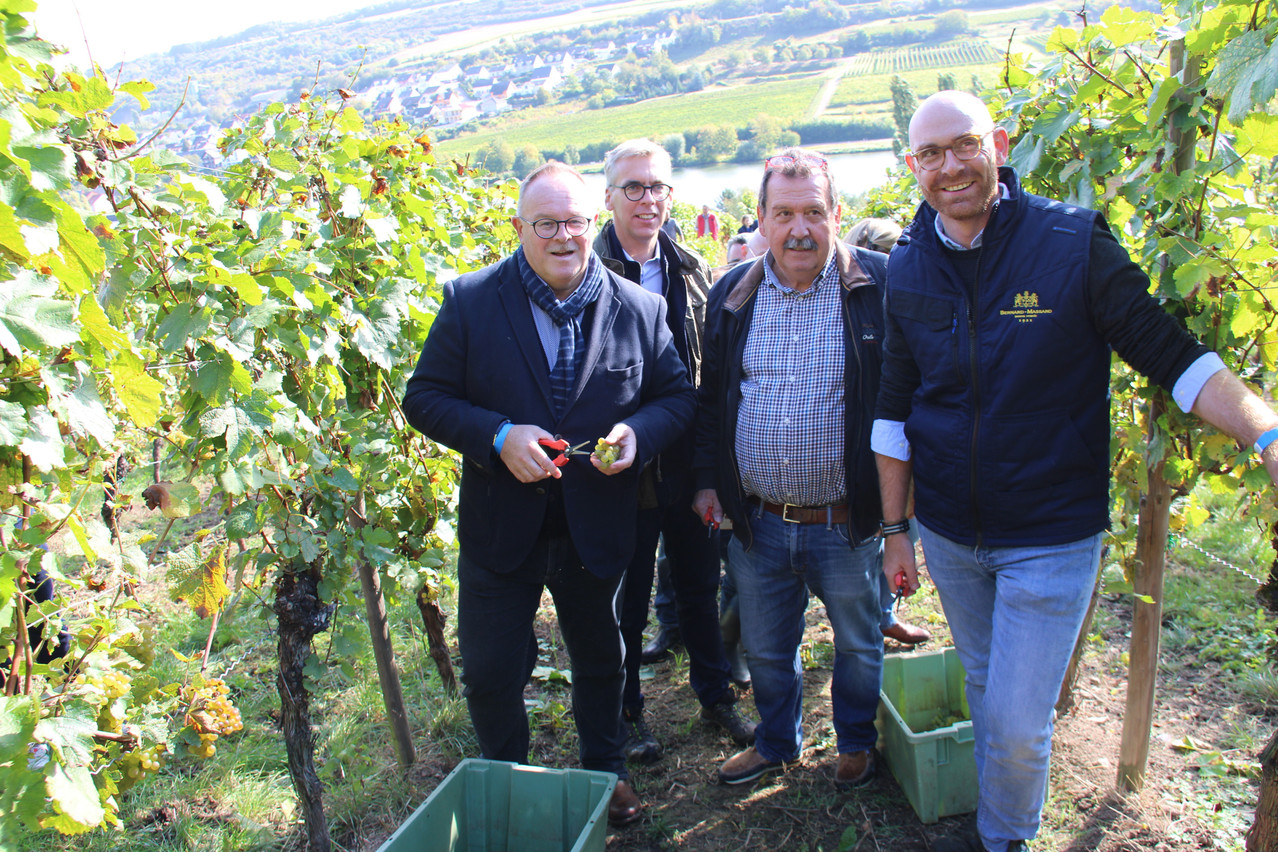Romain Schneider (LSAP), minister of agriculture, viticulture and rural development, came to the Maacher Fels vineyard in Grevenmacher to help the grape pickers. This was an opportunity for the minister to discuss with the winegrowers the quality of the harvest despite the vagaries of the weather.
“I am happy to share this special moment at the peak of the harvest with our winegrowers, and proud to know that, despite a difficult year, the 2021 vintage looks excellent. The quality of our wines and crémants is recognised far beyond our borders and is part of our traditions and our country’s DNA,” commented the minister. “They are also served by our embassy network abroad. Our winemakers have shown innovation and tenacity during this pandemic, and the wines and crémants of our wine route are proving to be highly appreciated by our consumers in search of local products from short circuits. I would also like to thank Adem for their excellent collaboration,” said Schneider.
Capricious weather
The quality of grapes and wine is subject to the vagaries of the weather. And this year, the spring was marked by unstable weather conditions. The vines remained in the “bud in cotton” stage for longer than usual, only breaking bud around 4 May--almost a week later than average--and the poor weather in May increased the delay in vine development by two weeks.
Afterwards, the high summer temperatures in June gave the vegetation an exceptional boost. Because of this rapid growth, the winegrowers worked hard to speed up the trellising of the vines. The delay in vegetation was thus completely made up for and the vines began the flowering phase around National Day in very good climate conditions. This is a very important stage for the vines as it determines the yield of the vintage. During this stage, the flowers of the inflorescences bloom, the caps fall off and the berries emerge.
In July, the stormy weather culminated in severe flooding on 14 July. Apart from a few flooded vineyards on the banks of the Sûre, the Moselle vineyards were spared this natural disaster.
Fruity and refreshing
Although the summer sunshine was well below average, temperatures were sufficiently high to allow the vines to continue to develop. The ripening phase of the grapes took place in a dry period with warm days and cool nights, ideal conditions for the ripening of the grapes and the development of the aroma precursors.
According to the experts, the harvested grapes are promising and a fruity and refreshing vintage with moderate alcohol content can be expected. The first “Fiederwäissen” are already in the cellars and show the potential of the 2021 vintage.
31 auxiliary grape pickers recruited
The grapes used for the production of Crémant de Luxembourg and premium wines must be harvested by hand.
Manual harvesting therefore makes an important contribution to guaranteeing the high quality of Luxembourg wines and crémants. In order to achieve this, and in order to fill the work peaks at the end of this month, the winegrowers mainly use seasonal labour.
Although the seasonal workforce comes mainly from neighbouring countries and from the east, Adem and the Institut viti-vinicole (IVV) have renewed their collaboration in recruiting seasonal grape pickers for wine companies and job seekers. The Institut viti-vinicole canvassed the wine growing companies, while Adem took care of the pre-selection of candidates. The result: 31 auxiliary grape pickers were recruited by Moselle winegrowers.
This story was first published in French on . It has been translated and edited for Delano.
